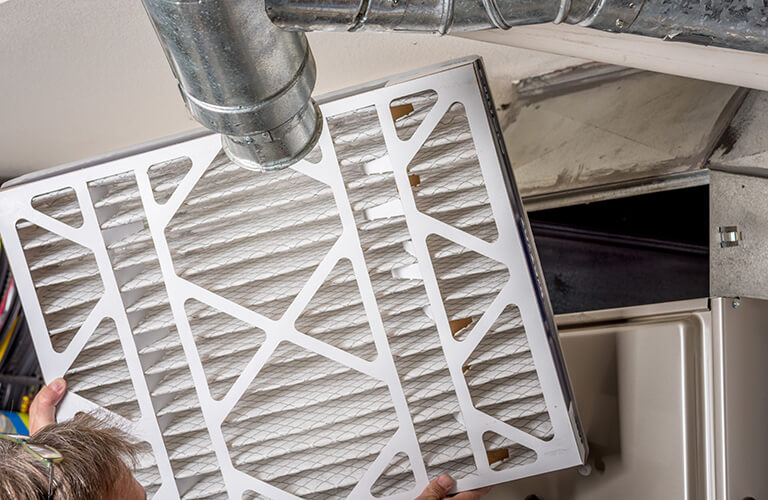How Often Should You Replace Your Furnace Filter?
There’s no single answer to ‘how often you should change your furnace filter (aka air filter). Below are some guidelines to help you know what to expect in terms of frequency.
Every home runs their HVAC unit for different amounts of time, and every home has a unique amount of dirt, dust, pet dander and allergens in the air. These are the things that most impact how long a filter lasts.
A good rule of thumb is to change 1-2 inch filters every three months, 4 inch filters every six months and 5 inch filters every 12 months.
Signs your air filter needs changed:
- The filter is visibly dirty. Certainly if you can’t see the material of the filter itself, it should be replaced.
- The heating/cooling system is running more frequently than normal.
- You home is more dusty than normal.
- You notice strange smells, or a burning smell near you HVAC unit.

Changing your furnace filter regularly ensures the air in your home will remain clear of dust and other contaminants. If you don’t change your filter, it will fill up and won’tbe able to trap new particles. A full filter will not be able prevent additional dirt and debris from circulating through your home, causing your family to breathe more dust and allergens on a daily basis. Additionally, a full furnace filter causes the motor on your furnace/hvac system to have to work harder, and it will subsequently become less efficient.
Frequently Open Windows and Doors
Windows and doors left open allow dust and contaminants from the outside air to accumulate in your home and put an added layer of filth on your air filters. If your windows and doors are often left open, one and two-inch filters will need to be replaced monthly, four-inch filters every two months and five-inch filters every three months.
Animals
If you have furry pets living in your home, this will shorten the life of your furnace filter. For one animal living at home, you should change your filter every two months for a one or two-inch filter, four months for a four-inch filter and six months for a five-inch filter.
The more animals living in your home, the shorter your filter is going to last. Having multiple animals means you should change a one or two-inch filter out every month, a four-inch filter every two months and a five-inch filter every three months.
If your pet sheds a lot, it’s a good idea to take them outside for a thorough brushing on a regular basis to reduce the amount of hair and dander that makes it into your home.
Smokers
If you have smokers in your home, this will have an effect on your filter as well. The more smokers you have, the shorter your filter life will be. If you have only one smoker in the house, you can get away with changing out a one or two-inch filter every two months, a four-inch filter every four months and a five-inch filter every six months. If you have multiple smokers in the house, you’ll need to adjust those numbers to once a month for one to two-inch filters, two months for four-inch filters and three months for five-inch filters.
Heater Fan
The frequency at which your heater fan is running will affect how often you need to replace your filter. If your heater fan is on constantly, you’ll need to change your filter each month, having it on sometimes will be every two months and never having it on can be every three months.
Dust
Excess dust is another factor that can shorten the life of your furnace filter. If your house is one that has a lot of dust, you’ll need to change one and two-inch filters out every month, four-inch filters every two months and five-inch filters every three months.
Allergies
If anyone in your home has allergies, they will benefit from more frequent air filter changes. A higher quality filter will cost more, but can be effective in reducing allergens.
Staying mindful of the factors that play a role in the air quality inside your home is a good measurement for how often your furnace filters need to be replaced. Keeping new filters in your furnace will help ensure that your furnace runs smoothly and efficiently and, most importantly, the air you and your family breathes is as clean as possible.
